Ever felt like your brain is wading through molasses? Or maybe important information seems to slip right out of your grasp? This frustrating phenomenon is called Brain Fog. This has impacted millions of people worldwide and they desperately want how to get rid of brain fog instantly. This phenomenon significantly disrupts mental clarity, focus, and memory.
A study published in the Journal of Neurology, Neurosurgery & Psychiatry, focused on the symptoms of “brain fog,” which include forgetfulness, difficulty in concentrating, and a general feeling of mental sluggishness. These experiences can have a significant impact on daily life, affecting work performance, relationships, and overall well-being.
Brain fog itself isn’t a medical diagnosis, but rather a collection of brain fog symptoms that can point to various underlying causes. By understanding these causes and implementing effective strategies, you can regain mental sharpness and reclaim control of your cognitive function.
Five Main Brain Fog Symptoms
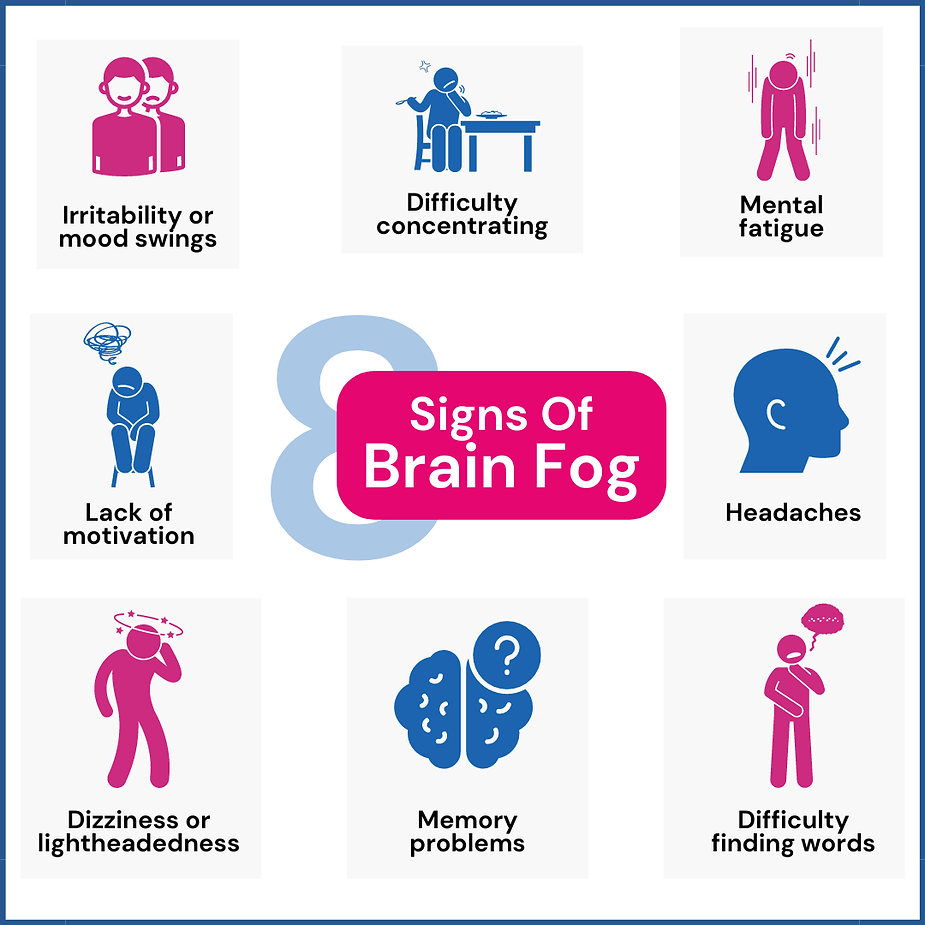
When people experience difficulty focusing, mental fatigue, or anxiety, they often wonder and ask what brain fog feels like. Here are the main brain fog symptoms:
1-Memory Lapses
Struggling to remember names, appointments, or where you placed your keys? Frequent forgetfulness can signal a problem.
2-Focus Fallout
Is your mind constantly wandering, making it hard to concentrate on tasks or follow conversations? It can hamper brain focus.
3-Mental Exhaustion
Feeling mentally drained even after simple tasks? Brain fog often accompanies a persistent sense of fatigue.
4-Slowed Thinking
Does it seem like it takes longer to understand information or finish tasks? Brain fog can delay mental processing.
5-Decision Dilemmas
Difficulty making choices, even simple ones, may indicate clouding your judgment.
What Causes Brain Fog?
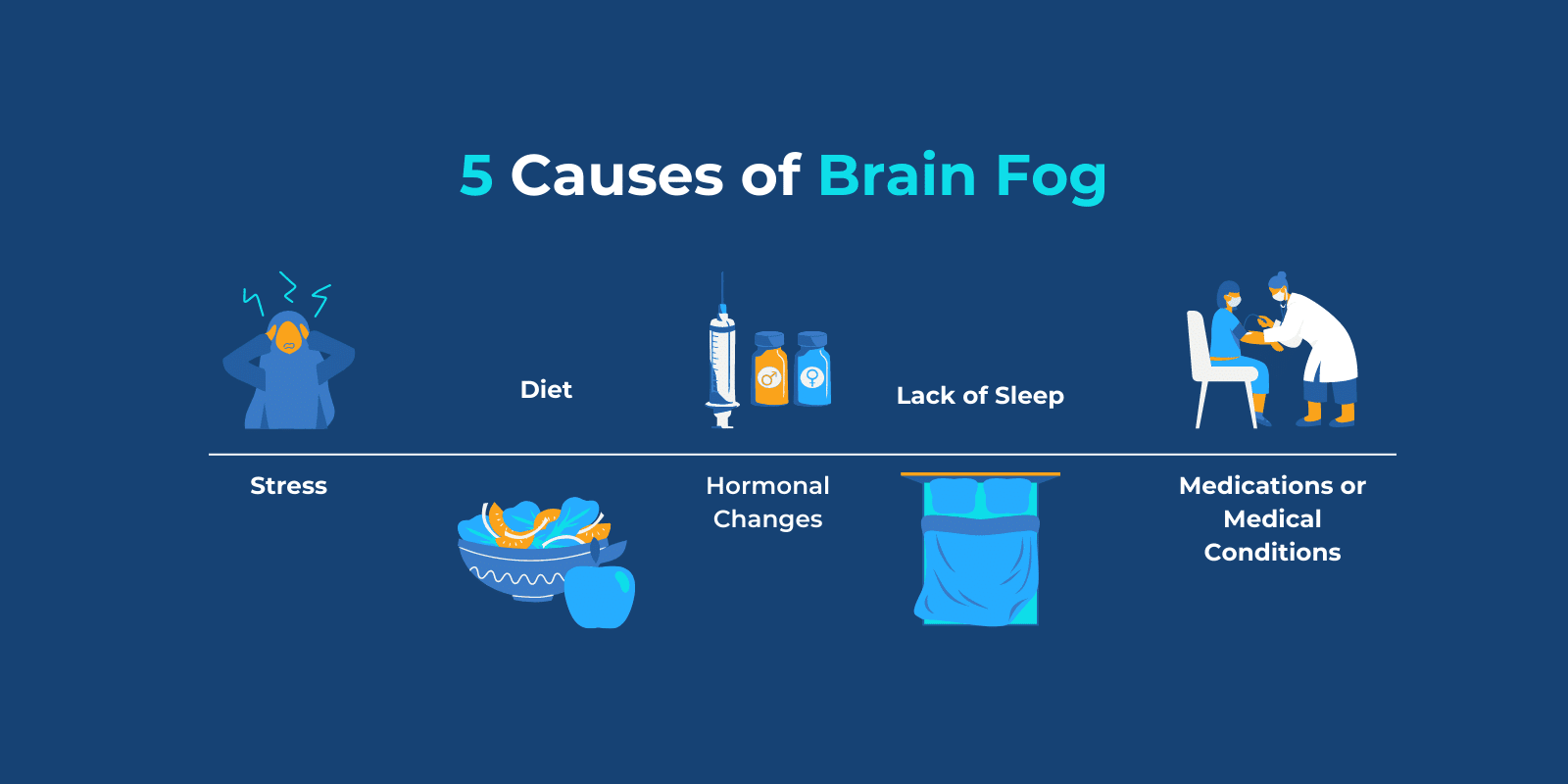
Brain fog can descend upon us like a sudden mental fog bank, leaving us feeling disoriented and frustrated. But what exactly triggers this frustrating phenomenon? Here, we delve into the various factors that can contribute to this problem:
1-Stress Overload
Ever feel like your brain can’t handle one more thing? You’re not wrong. Chronic stress releases the hormone cortisol, which can negatively impact memory and focus. A study published that long-term stress or being exposed to certain hormones for a long time can affect a part of the brain called the hippocampus. This can happen because the connections between nerve cells in the hippocampus can change, but it’s not permanent and the cells don’t die.
2-Sleepless Nights
Skimping on sleep is a recipe for brain fog. During sleep, our brains consolidate memories, process information, and remove waste products. Research has demonstrated that sleep deprivation, whether total or partial, leads to various negative effects, such as cognitive performance impairments.
Consequently, whenever sleep is compromised, our brains struggle to function optimally, leading to impaired focus, memory, and alertness.
3-Dehydration
Our brains are about 80% water, making hydration essential for peak cognitive performance. Even mild dehydration can trigger brain fog. In a research study involving 16 participants, it was found that after 24 hours of water deprivation, fatigue levels increased and alertness decreased.
4-Nutritional Deficits
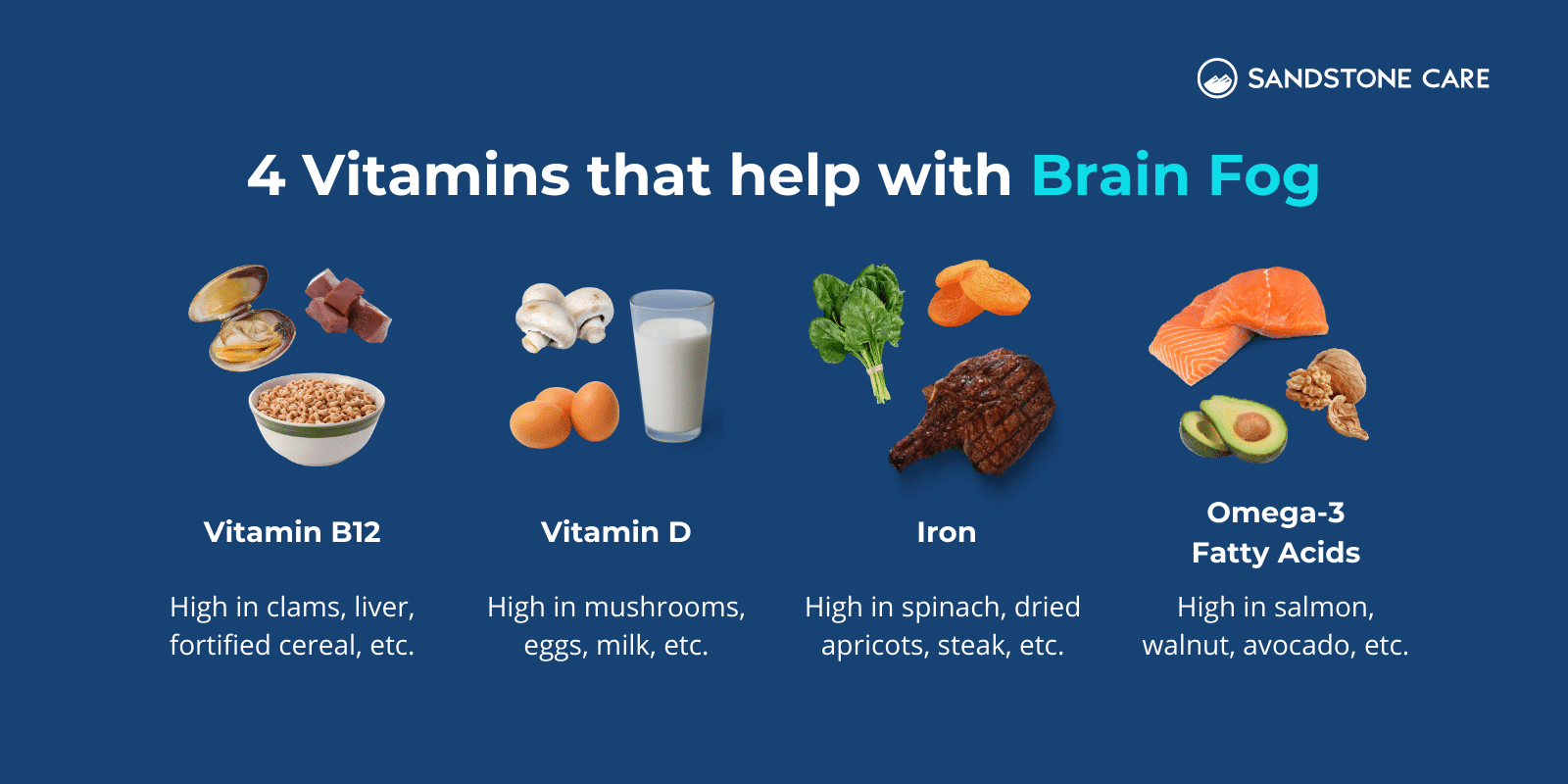
Various other factors contribute to this frustrating phenomenon, one crucial aspect often overlooked is nutrition. Deficiencies in key nutrients can significantly worsen brain fog by depriving your brain of the essential building blocks and fuel it needs to function optimally. Here’s a closer look at how deficiencies in specific nutrients can impact brain function:
Omega-3 Fatty Acid Starvation
Our brains are like fatty fish – they crave omega-3 fatty acids, particularly DHA (docosahexaenoic acid). These essential fats play a crucial role in building and maintaining brain cells, impacting memory, learning, and focus. When omega-3 intake is insufficient, your brain suffers.
Research also covered the relationship of Omega-3 Fatty Acids with Dementia and Cognitive decline and found that lower DHA levels were associated with poorer cognitive performance in older adults. Brain fog symptoms like forgetfulness, difficulty concentrating, and mental fatigue can become more pronounced when your brain doesn’t have enough omega-3s to function optimally.
B Vitamin Blues
B vitamins, particularly B12, are essential for neurological function and the production of neurotransmitters that regulate mood, memory, and focus. Deficiencies in B12 can significantly contribute to this mental disorder, causing fatigue, difficulty concentrating, and a feeling of mental sluggishness.
A study published in Nutritional Neuroscience found that vitamin B12 supplementation improved cognitive function in older adults with mild cognitive impairment. When you lack B12, your brain can’t produce the necessary neurotransmitters to function optimally, leading to the frustrating symptoms of brain fog.
Vitamin D Deficiency
Vitamin D plays a vital role in brain health and cognitive function. Studies suggest a link between low vitamin D levels and an increased risk of brain fog and cognitive decline.
Research indicates that Vitamin D aids in protecting the nervous system by regulating nerve growth and neurotrophic factors like nerve growth factor.
5-Hormonal Fluctuations
Hormonal changes, particularly those associated with menstruation, pregnancy, and menopause, can contribute to brain fog. These fluctuations can impact neurotransmitters like estrogen and progesterone, which affect memory and focus.
As highlighted in a recent research article, the Australasian Menopause Society notes that brain fog during menopause can result in difficulties with immediate focus, increased distractibility, misplacing items, and experiencing lapses in time perception.
6-Increased Screen Time

Electromagnetic radiation emitted by electronic devices such as computers, mobile phones, and tablets has been identified as a potential cause of brain fog. Studies have indicated that prolonged exposure to these devices, including smartphones, personal computers, and televisions, can have significant implications for mental health. This constant exposure has been linked to increased levels of stress and anxiety, as well as various sleep issues, affecting both children and adults alike.
7-Pollution and Toxins
Ever feel like your brain is stuck in rush hour traffic – sluggish, slow, and overwhelmed? Living in a polluted environment can significantly contribute to impacting memory, focus, and cognitive function. Here’s how the air we breathe and the world around us can influence our mental clarity:
Microscopic Invaders: Air Pollution’s Assault
Air pollution is not only harmful to your respiratory system, but it can also negatively impact your brain. PM2.5, which are extremely small particles present in polluted air, can enter the brain through the bloodstream and the olfactory bulb (the smell receptor).
A study published found an association between exposure to pollutants and cognitive health. These pollutants can trigger inflammation in the brain, disrupt communication between neurons, and hinder cognitive function, leading to the difficulty focusing and brain fog symptoms.
Traffic Fumes
Traffic fumes are a major source of air pollution, containing harmful pollutants like nitrogen dioxide and volatile organic compounds (VOCs). These toxins can disrupt the delicate balance of neurotransmitters in the brain, crucial chemicals that regulate mood, memory, and focus.
Research published found that exposure to traffic-related air pollution was associated with decreased cognitive function in elderly adults. When neurotransmitter function is disrupted by traffic pollutants, it can manifest as brain fog, decreased memory, and difficulty focusing amidst the mental “noise.”
Environmental Toxins
Everyday environmental toxins, apart from air pollution, can also contribute to brain fog. Neurotoxic effects can be caused by pesticides, household cleaners, and even certain flame retardants. Studies have revealed that different pesticides can increase the levels of inflammatory factors in the body, leading to neuroinflammation, neuronal cell death, and cognitive impairment. These toxins can hinder brain development and function, resulting in symptoms such as brain fog, fatigue, and difficulties with learning and memory.
8-Medication Mischief
Certain medications, including antidepressants, antihistamines, and some blood pressure medications, can list brain fog as a side effect. If you suspect your medication may be contributing to your brain fog, consult your doctor about potential alternatives.
9-Underlying Health Conditions
Several health conditions, such as chronic fatigue syndrome, anemia, and thyroid disorders, can have brain fog as a symptom. Diabetes can also wreak havoc on your blood sugar levels, and this imbalance can extend to your brain health as well. If you experience persistent brain fog alongside other concerning symptoms, consult your doctor to rule out any underlying medical conditions.
10- Excess Use of Alcohol
Excessive or chronic alcohol consumption can impair cognitive function and contribute to brain fog studies show. Alcohol affects neurotransmitter levels in the brain, disrupts sleep patterns, and can lead to dehydration, all of which can contribute to feelings of mental fog or confusion.
How to Get Rid of Brain Fog: Treatment and Strategies
Feeling like your brain is stuck on “slow”? Don’t despair! Here are some natural approaches to clear brain fog instantly and reclaim your mental sharpness:
1-Prioritize Quality Sleep
Quality sleep is the best and top brain fog treatment. Aim for 7-8 hours of restful sleep each night. During sleep, your brain consolidates memories, processes information, and removes waste products. A 2018 review published in Sleep Medicine emphasizes the importance of sleep for cognitive function. When sleep is compromised, our brains struggle to focus, remember, and stay alert.
2-Manage Stress Effectively
Chronic stress takes a toll on your brain function. Implement relaxation techniques like yoga, meditation, or deep breathing to combat stress and enhance cognitive performance. A 2017 study published in Nature Reviews Neuroscience highlights the link between chronic stress and impaired hippocampal function, a brain region crucial for memory.
3-Brain Fog Treatment with Workout
There isn’t one single “best” and researched brain fog workout, as the most effective approach depends on your fitness level and preferences. However, several well-researched exercise types have been shown to improve cognitive function and potentially combat brain fog.
Aerobic Exercise Boosts Your Brain Signals
Aerobic activities like Brisk walking, jogging, swimming, biking, and dancing get your heart rate up and blood flowing, which is beneficial for brain health.
Research suggests that aerobic exercise can structurally influence the brain, leading to improvements in specific aspects of cognitive function, such as executive function and memory.
You will be inspired to read our detailed article on Running Five Miles a Day
High-Intensity Interval Training (HIIT)
HIIT involves alternating short bursts of intense activity with periods of rest or low-intensity exercise. This type of workout can be particularly beneficial for boosting cognitive function in a time-efficient way.
Scientists suggest that HIIT can improve cognitive function in healthy young adults, including memory and executive function.
Strength Training For Better Mental Clarity
Bodyweight exercises, weightlifting, and resistance band exercises help build muscle mass, which can indirectly benefit brain health. Additionally, the focus and coordination required during strength training can improve cognitive function.
Research found that strength training induces functional changes in the brain and enhances cognitive function in both healthy adults and older individuals, including those with cognitive impairments.
Note: Aim for at least 30 minutes of moderate-intensity exercise most days of the week.
4-Dietary Modifications for Brainpower
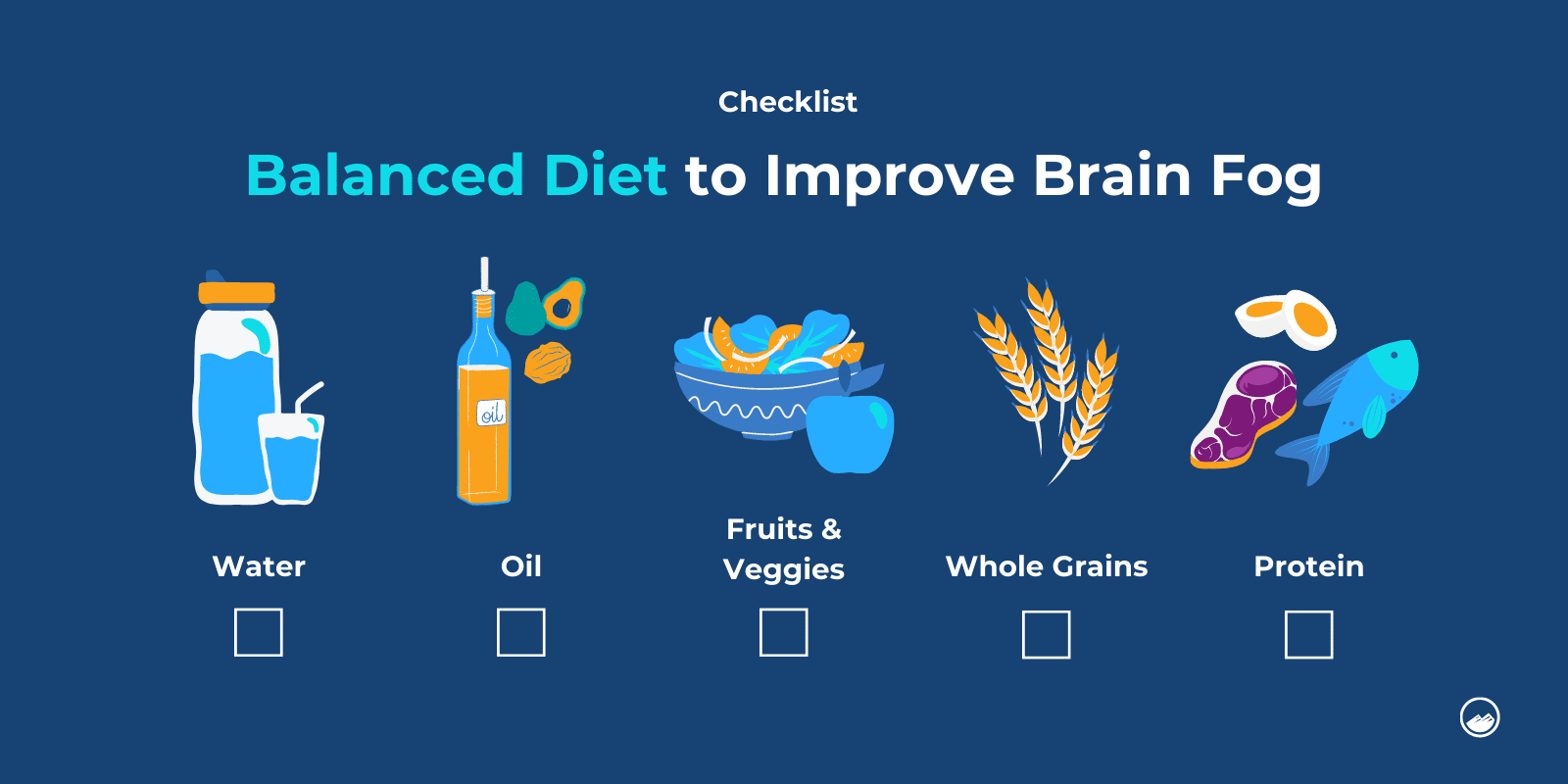
Hydration is Key
Dehydration, even mild, can trigger brain fog. Make water your go-to beverage and aim to drink plenty throughout the day.
Fuel Your Brain with Nourishing Foods
-
Aim for a variety of colorful fruits and vegetables. These are packed with antioxidants that protect brain cells from damage and promote cognitive health.
-
Choose whole grains like brown rice, quinoa, and whole-wheat bread over refined carbohydrates. They provide a steady stream of glucose, the brain’s preferred energy source, for sustained focus and concentration.
-
Don’t underestimate the power of omega-3 fatty acids, particularly DHA. Include fatty fish like salmon, mackerel, and sardines in your diet. If you’re vegetarian or vegan, consider incorporating flaxseeds, walnuts, or chia seeds as excellent plant-based alternatives. Studies suggest higher DHA levels are associated with better cognitive function.
For more dietary options jump to our best nutritional guides.
5-Intermittent Fasting (IF) for Brain Fog
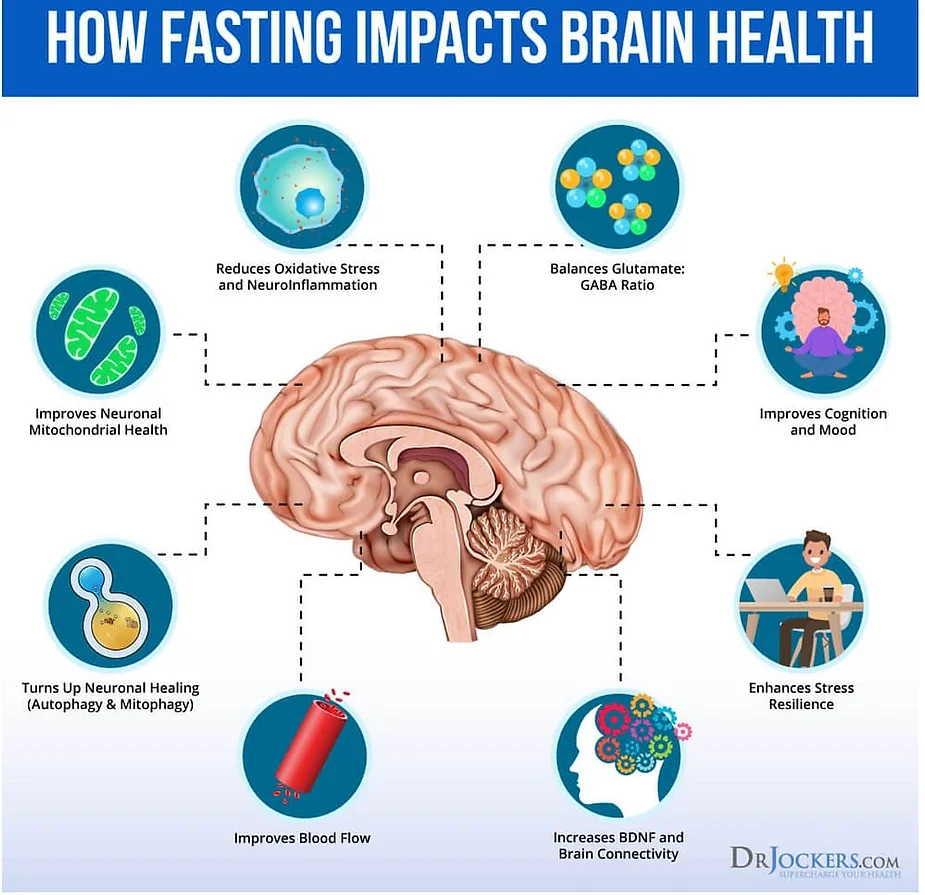
Cellular Clean-Up: Intermittent Fasting (IF) cleans out damaged cells and promotes the renewal of healthy ones. This can potentially improve brain health and function, leading to increased focus and reduced brain fog.
Inflammation Reduction: IF has been linked to a reduction in inflammation markers, which may result in sharper thinking and improved cognitive performance. It may also increase levels of BDNF, a protein essential for brain cell growth and repair, which could improve memory, learning, and cognitive function.
Improved Insulin Sensitivity: IF may improve insulin sensitivity, and the body’s ability to regulate blood sugar levels. Stable blood sugar is crucial for brain function, and fluctuations can contribute to brain fog. By improving insulin sensitivity, IF might help maintain stable energy levels and enhance cognitive clarity.
6-Consider Targeted Supplements
In addition to the natural remedies, supplements could also aid in reducing the Brain Fog. Natural remedies and supplements can reduce brain fog. Fish oil contains DHA which enhances brain function, motor skills, and vision.
Ginkgo Biloba extract benefits cognitive function. Choline bitartrate supports cell membrane health. Gamma Oryzanol promotes relaxation and sleep. L-Theanine reduces anxiety. Phosphatidylserine improves brain function.
Inositol aids nervous system function. Ginseng extract regulates immune response. Soy lecithin improves memory. L-Carnitine L-Tartrate enhances brain function. Vitamins C, A, E, and B Complex support overall health.
These supplements might offer additional support. Consult your doctor before starting any supplements to discuss potential benefits and interactions with any medications you’re taking.
FAQ-1: Is there an overlap between Anxiety and Brain Fog?
Anxiety and brain fog are related but different mental states. Anxiety is the persistent worry, fear, or apprehension, often with physical symptoms. Brain fog is difficulty focusing, memory lapses, and mental fatigue. Anxiety can cause brain fog, but they can occur separately. Anxiety is emotional, brain fog is cognitive. Brain fog can cause anxiety due to cognitive challenges.
FAQ-2: How Long Does Brain Fog Last?
The duration of brain fog can vary widely depending on the underlying cause and individual factors. It can last anywhere from a few minutes to several hours or even persist for days or weeks in some cases.
Conclusion
Brain fog doesn’t have to be a permanent fixture in your life. By understanding the causes and implementing simple yet effective lifestyle and dietary changes, you can cure this foggy state of the brain, regain mental clarity, focus, and cognitive sharpness. Remember, consistency is key! The more you prioritize these strategies, the sharper and more engaged your brain will become.
Share Your Story!
Have you experienced brain fog? What strategies have helped you combat it? Share your experiences and questions in the comments section below!
Stay Tuned for More!
Subscribe for more brain health and wellness tips to keep your mind sharp and your memory thriving!












